
Nurse Consulting: The Hidden Career Path with Ultimate Flexibility
Ever been told you have “so much potential” beyond the bedside but felt completely lost about what that actually means? If someone mentioned “consulting” as an option, you might have nodded politely while thinking, “What exactly does a consultant even do?”
You’re not alone. Consulting remains one of the most misunderstood alternative career paths for nurses, despite being one of the most versatile and rewarding ways to leverage your clinical expertise. The truth is, nurse consulting isn’t just one job—it’s an entire universe of opportunities that most nurses never realize exists.
What Exactly Is Nurse Consulting?
Simply put, nurse consultants are healthcare experts who solve problems, improve processes, and provide specialized guidance to organizations that need nursing knowledge. Think of yourself as a strategic partner who brings clinical insights to help organizations make better decisions, implement improvements, or navigate complex healthcare challenges.
The demand for nurse consultants has never been higher. Companies developing healthcare solutions, implementing new technologies, or entering the healthcare market often lack the frontline perspective that only clinical experience can provide. They understand the theory but miss the practical realities of how healthcare actually works. As a nurse consultant, you bridge that gap, offering real-world insights that ensure their innovations are grounded in clinical reality and addressing genuine healthcare challenges.
Unlike bedside nursing where you care for individual patients, consulting allows you to impact entire systems, programs, and populations. You’re still using your nursing knowledge, just applying it to organizational challenges rather than direct patient care.
The Surprising Variety of Nurse Consulting Roles
One of the biggest misconceptions about nurse consulting is that it’s a single career path. In reality, there are numerous specializations, each offering unique opportunities to apply your clinical background in innovative ways. You can focus on one specialty or diversify across multiple areas—your nursing experience provides a solid foundation for all of the options below.
Healthcare Organizational Consulting
This is what most people picture when they think of consulting—working with hospitals, clinics, and health systems to improve operations. Healthcare organizational consultants might help facilities implement new technologies, improve patient satisfaction scores, develop policies and procedures, or navigate regulatory compliance issues. Your clinical experience gives you credibility that general business consultants simply can’t match when discussing patient care implications.
Educational Consulting
Educational companies desperately need nurses to develop curricula, review textbooks, create exam questions, and ensure content accuracy. Whether it’s nursing schools, continuing education providers, or companies developing healthcare training programs, your expertise ensures that educational materials reflect real-world clinical practice. This type of consulting often offers excellent work-life balance and can frequently be done entirely remotely.
Public Health Consulting
Public health consulting allows you to address population health challenges, develop community health programs, and work on policy initiatives that impact entire communities. Public health consultants might help design vaccination campaigns, develop health education materials, or assist with emergency preparedness planning. This specialty offers the satisfaction of knowing your work improves health outcomes for thousands of people.
Technology and Digital Health Consulting
Healthcare technology companies need nurses to ensure their products actually work in clinical settings. As a technology consultant, you might help develop user interfaces for electronic health records, test new medical devices, or provide clinical input on telehealth platforms. This rapidly growing field combines your healthcare knowledge with cutting-edge innovation.
Legal and Forensic Consulting
Legal nurse consultants review medical records, provide expert testimony, and help attorneys understand complex medical issues in malpractice cases, personal injury claims, and workers’ compensation cases. This specialty requires attention to detail and strong analytical skills but offers excellent compensation and intellectually stimulating work.
Regulatory and Compliance Consulting
Healthcare organizations must navigate increasingly complex regulations, and they need experts who understand both the clinical implications and regulatory requirements. Regulatory consultants help organizations prepare for surveys, develop compliance programs, and implement quality improvement initiatives.
Occupational Health Consulting
Companies across all industries need guidance on employee health and safety issues. Occupational health consultants might develop workplace wellness programs, conduct health screenings, or help organizations manage workers’ compensation claims. This specialty often offers regular business hours and the opportunity to work with diverse industries beyond healthcare.
Why Nurses Excel at Consulting
Your nursing background provides several advantages that make you exceptionally suited for consulting work. You have an ability to assess complex situations quickly, communicate with diverse stakeholders, and think systematically about problems, which directly translates to consulting success.
Perhaps most importantly, you understand the practical realities of healthcare delivery. When you recommend changes or improvements, you know what will actually work in real-world clinical settings because you’ve lived those experiences. This practical wisdom is invaluable to organizations seeking solutions that look good on paper but might fail in practice.
Your clinical credibility also opens doors that remain closed to other consultants. When you walk into a meeting wearing your RN credential, healthcare professionals listen differently. They know you understand their challenges because you’ve faced them yourself.
The Consulting Lifestyle: Flexibility Meets Professional Growth
One of the most appealing aspects of nurse consulting is the flexibility it offers. Many consultants work independently, choosing their clients and setting their own schedules. This autonomy allows you to balance professional obligations with personal commitments in ways that traditional nursing roles rarely permit.
Remote work opportunities abound in nurse consulting, with many specializations offering fully virtual positions. Whether you’re providing educational consulting from your home office, conducting telehealth screenings for occupational health clients, or reviewing medical records for legal cases, location independence has become increasingly common. This flexibility means you can build a consulting practice that fits your lifestyle—whether that’s working around family commitments, traveling while you work, or simply avoiding long commutes to healthcare facilities.
Consulting also offers intellectual stimulation that many bedside nurses crave. Each project presents new challenges, requiring you to learn about different organizations, industries, and problems. This variety keeps the work engaging and provides continuous opportunities for professional growth.
Financially, consulting can be highly rewarding. Independent consultants often earn significantly more per hour than staff nurses, and even employed consultants typically enjoy competitive salaries with better work-life balance than traditional nursing roles.
Common Myths About Nurse Consulting
Many nurses hesitate to explore consulting because of misconceptions about what it requires. Let’s address the most common myths:
- Myth: You need an advanced degree. While some consulting roles prefer advanced degrees, many successful nurse consultants have succeeded with their RN and relevant experience. Your clinical expertise and problem-solving abilities matter more than your educational credentials.
- Myth: You need years of experience. While experience is valuable, what matters most is your ability to apply nursing knowledge to organizational challenges. Newer nurses with strong analytical skills and fresh perspectives often bring valuable insights to consulting projects.
- Myth: Consulting is too competitive. The demand for healthcare expertise far exceeds the supply of qualified nurse consultants. Organizations across industries need nursing insights, creating abundant opportunities for those ready to step into consulting roles.
- Myth: You can’t make a stable living as a consultant. Many nurse consultants maintain steady income through long-term contracts, retainer agreements, or full-time consulting positions with firms. The key is developing strong client relationships and continuously delivering value.
Your Path to Consulting Success
At the Stepping Stone Academy, our Nurse Consulting course demystifies this career path and provides the practical guidance you need for a successful transition. Led by Dr. Alexandra Murr, who successfully transitioned from hospital leadership to consulting, this program covers everything from identifying your niche to building client relationships.
For those seeking personalized guidance, we also offer an eight-week mentorship program where you’ll work directly with Dr. Murr to develop your consulting strategy, build your professional network, and navigate the early stages of your consulting career.
Nurse consulting isn’t just about leaving bedside nursing—it’s about expanding your professional impact beyond individual patients to entire organizations and communities. Your clinical expertise, combined with strategic business thinking, positions you to solve complex problems and drive meaningful improvements across the healthcare industry.
Ready to unlock the consultant within you? Learn how to build a successful consulting practice in our Nurse Consulting course, with an optional 8-Week Nurse Consulting mentorship from Dr. Alexandra Murr to guide your transition from bedside to strategic consulting roles.
